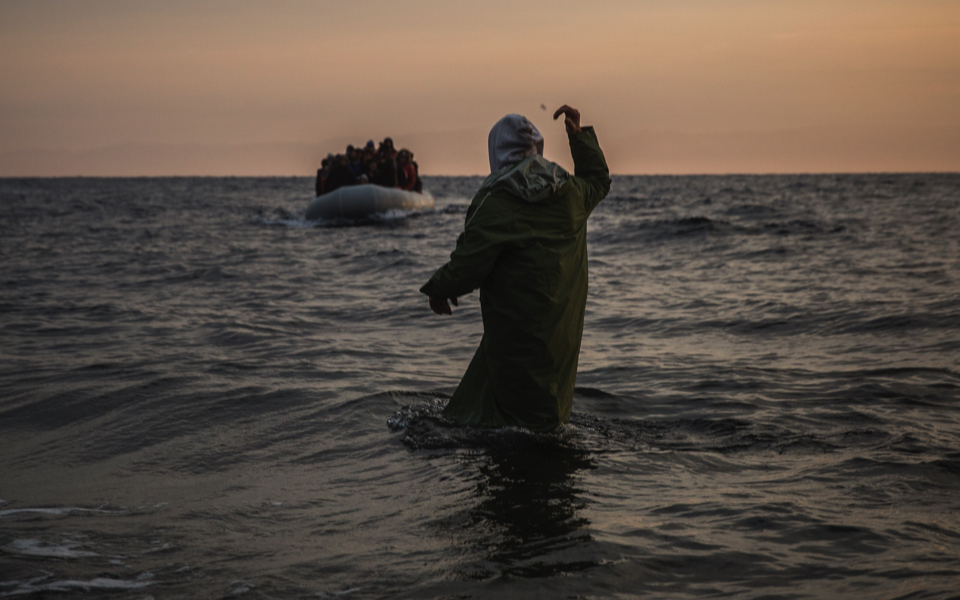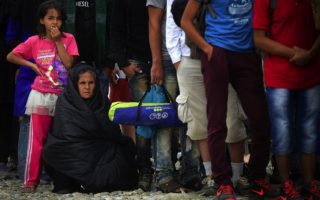Greece: FYROM has closed its borders to Afghan migrants

Former Yugoslav Republic of Macedonia (FYROM) closed its border to Afghan migrants early Sunday, Greek police said, slowing the admission of refugees to a trickle and leaving a growing bottleneck of people stuck at their shared border.
A FYROM police spokeswoman denied there was any new prohibition regarding Afghans, blaming the problem on Serbia, the next nation along the Balkans migration route into Western Europe.
By early afternoon, about 1,000 migrants were waiting at the Greek border camp in Idomeni – and at a gas station only 17 kilometers (11 miles) away, 80 buses with 4,000 more migrants were waiting to take them to the border.
Greek police said FYROM refused to let Afghans through because Serbia made the same decision and officials feared the migrants would get stuck in FYROM.
"The authorities of the Former Yugoslav Republic of Macedonia informed us that, beginning at dawn Sunday, they no longer accept Afghan refugees because the same problem exists at their border with Serbia," Petros Tanos, spokesman for Greek police's Central Macedonia division, told The Associated Press.
Despite the reports, about 500 migrants of all nationalities made the trek on foot from the gas station to the border Sunday.
"I can no longer wait," said 17-year-old Ali Nowroz, one of the trekkers from the Afghan city of Jaghori Zeba. "We have spent three nights in the cold, we are hungry. They told me that the borders have been closed to us. However, when I started from Afghanistan I knew borders were open for us. I am going to the Idomeni border crossing to find out and ask why they have closed it."
Since dawn Sunday, only 150 refugees from Iraq and Syria were allowed into FYROM, on top of 310 allowed in Saturday.
At the border Sunday, two FYROM and two Czech policemen were thoroughly inspecting the documents of Iraqi and Syrian migrants and would only let them pass if they had passports or ID cards. Previously, FYROM authorities had accepted Greek police documents attesting that an individual had been processed.
"Me and my brother have been waiting for three days here but we cannot cross because we have no passports," said Hadi Dakhil, a 25-year-old from the Iraqi city of Shingal. "The Turks confiscated them and, without them, the Macedonian authorities will not accept us."
EU countries have sought to cap the influx of refugees after more than one million people entered in 2015. Nations along the entry route have agreed to jointly control the flow of migrants through their territories.
FYROM police spokeswoman Natalija Spirova Kordikj told the AP that her country had not closed its borders to Afghans, saying nine had been admitted Saturday and one came through after midnight. Kordikj said it was Serbia that had stopped admitting Afghans.
At a migrant collection center in Tabanovce, on FYROM’s side of its border with Serbia, 617 Afghan refugees are waiting to be allowed into Serbia, Kordikj said.
A Serbian official, in turn, said the decision to block refugees from Afghanistan was made by Austria and Slovenia. Serbian Labor Minister Aleksandar Vulin said Sunday that "everyone can move in accordance with the rules set by Austria and Slovenia."
"Serbia does not decide who can pass through its territory without consulting the states up the migrant route," he said. "(Our) borders are open, Serbia has not closed its borders with Macedonia or Bulgaria in any way."
At the Idomeni refugee camp, Greek police prevented Afghan migrants from crossing the border, and back at the gas station, they persuaded some to board buses back to Athens, 540 kilometers (335 miles) away.
A high-ranking Greek police officer who insisted on anonymity said police were trying to avoid a pileup of rejected refugees that could lead to violence.
So far, the Afghan refugees are peaceful but frustrated.
"I have been in the camp for two days, waiting to cross and continue my journey to Germany," said Masoud Jahangirg, 19. "They informed us today that borders are closed to us and I wonder why. I don't know what to do. I can only wait. But why accept only the Syrians and the Iraqis and not us?"
[AP]





